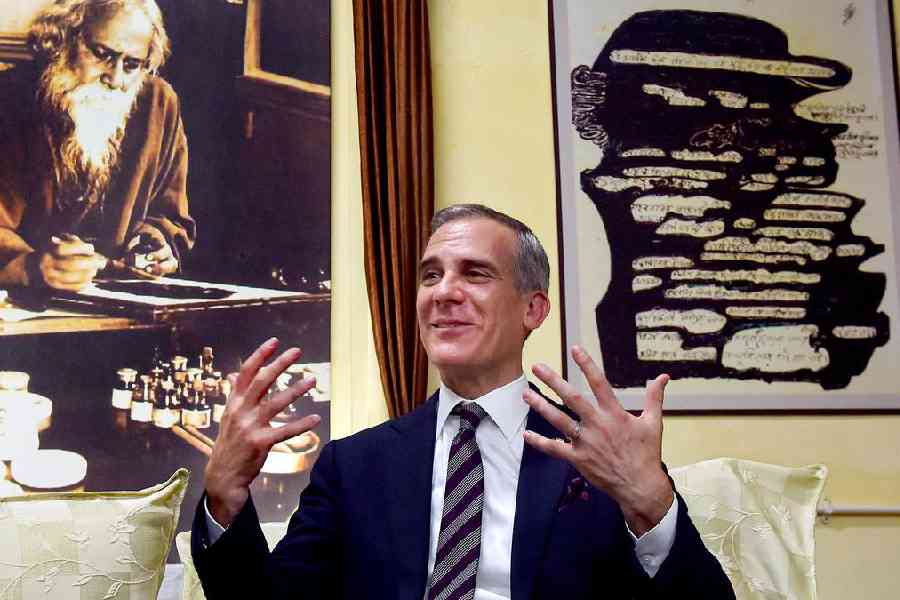US ambassador to India Eric Garcetti on Thursday spoke about his country’s “human concerns” about the strife in Manipur, before offering to assist if asked and laying stress on the need for “building a sense of belonging for everyone” to maintain democracy.
“When you ask about US concerns (on Manipur), I don’t think it’s about strategic concerns, it’s about human concerns.... You don’t have to be an Indian to care when children or individuals die in this sort of violence,” Garcetti said in Calcutta in response to a question from The Telegraph on minority rights and the larger issue of democracy in India.
“We stand ready to assist in any ways if asked. We know it’s an Indian matter and we pray for that peace and that it may come quickly. Because we can bring more collaboration, more projects, more investment if that peace is in place,” he added.
Although couched in diplomatic neutrality, his concluding remarks echoed the demand from a section in India that has been decrying the BJP-led government’s perceived attempts at dividing the country.
“Building a sense of belonging for everyone should be the guiding principle,” said Garcetti, explaining how to maintain democracies.Amid questions about when the situation would normalise in Manipur, the US ambassador underscored the need for peace for sustained progress of the region.
“We know peace as a precedent for so many good things. There has been so much progress in the Northeast and the east.... Countries have done some remarkable things in recent years and those cannot continue without peace,” said Garcetti.
In New Delhi, asked about Garcetti’s remarks, Indian external affairs ministry spokesperson Arindam Bagchi said: “I haven’t seen those comments by the US ambassador. If he has made them, we will see.... I think we would also seek peace there and I think our agencies and our security forces are working, our local government is working on it. I am not sure foreign diplomats would usually comment oninternal developments in India but I wouldn’t like to make a comment without seeing exactly what has been said.”
In his opening remarks, Garcetti had said that India’s east and northeast “matter to the US”.
“Its people, its places, its potential and its future matter to us,” he said.
The ambassador did not elaborate but India’s east and northeast are strategically important to the US not only because they share borders with China, Myanmar, Bangladesh, Nepal and Bhutan but also because of America’s interest in establishing maritime supremacy in the Bay of Bengal — a part of its overall Indo-Pacific strategy.
“Stability in this region, be it in Manipur or neighbouring Mizoram or even Bangladesh, for that matter, is very important for the US to counter the Chinese initiatives in the region,” said Sourabh Sen, a strategic affairs expert.
The US diplomat also spoke of the challenges facing democracy in countries like the US and India.
“Democracies are both about majority rule and all voices being protected.... We talk about these in an unabashed way, we believe them deeply in our core. They are reflected in the documents of our country as they are reflected in documents of yours as well,” he said.
“Democracy is not just about establishing democracy, but also about maintaining it.... That’s something we struggle to do in the US,” he said, adding that he wasaware that the same hadbeen a challenge “since the founding of the Republic of India”.
Although he commented on the situation in Manipur and the challenges facing democracies, Garcetti clothed his remarks in diplomatic sobriety.
“We would avoid those conversations and we would also not wag our finger.... There is an unconscious paternalism that for too long has defined the relations with India,” he said.
“India is for Indians to determine its pathway.... We are here as friends. We are here to have conversations that are important. We are here to engage on the promotion of everyone’s rights.”












